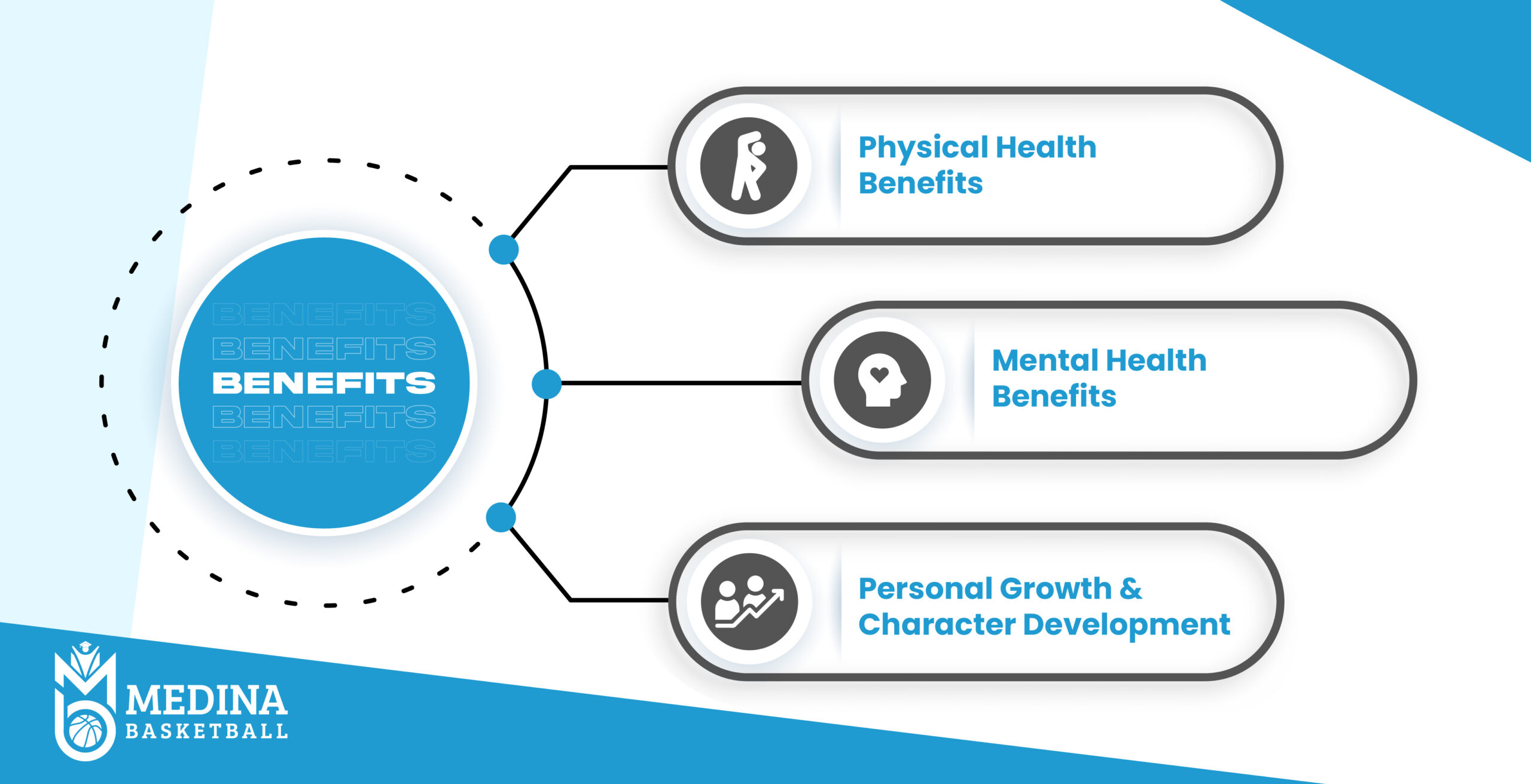Picture this: the buzzer sounds, the crowd roars, and you're on the court, ready to…

Picture this: the sun sets low, casting a golden hue upon the grassy expanse of the soccer field. The air crackles with anticipation, and hearts beat in rhythm with the impending match. Yet, beyond the thrill of the game lies a treasure trove of invaluable gems – the profound benefits of team sports that gleam brightly with each passing season.
As each season came to a close, I found myself reflecting on the countless rewards unlocked through team sports. Beyond the wins and losses recorded on the scoreboard, I discovered the true essence of personal growth, resilience, and community. And with every new season, I eagerly anticipate the opportunity to embark on this journey once more, knowing that the rewards awaiting me extend far beyond the confines of the field.
As we delve into this reflective journey, let’s uncover the hidden riches that team sports bestow upon us. From the sweat-drenched fields to the jubilant victory celebrations, every moment offers a chance for introspection, growth, and enlightenment.
Physical Health Benefits
- Improved cardiovascular health: Participating in team sports often involves activities that get your heart pumping and blood flowing. Whether running up and down the basketball court, sprinting across the soccer field, or swimming in the pool, team sports provide excellent cardiovascular exercise. Regular participation in these activities can help strengthen your heart muscle, improve circulation, and reduce the risk of cardiovascular diseases such as heart attacks and strokes. Additionally, sustained physical activity can help lower blood pressure and cholesterol levels, promoting overall heart health.
- Enhanced strength and endurance: Team sports require a combination of strength and endurance to perform optimally. Practices and games typically involve various movements like running, jumping, throwing, and lifting, which engage multiple muscle groups throughout the body. Over time, consistent participation in team sports can improve muscular strength, endurance, and power. Stronger muscles not only enhance athletic performance but also support better posture, balance, and stability, reducing the risk of injuries both on and off the field.
- Better coordination and motor skills development: Team sports demand precise coordination and fine-tuned motor skills to execute movements accurately and efficiently. From dribbling a basketball to swinging a bat to striking a volleyball, players must synchronize their movements to achieve desired outcomes. Regular practice and gameplay help improve hand-eye coordination, spatial awareness, and proprioception—the body’s ability to perceive its position and movements in space. These enhanced motor skills benefit athletic performance and carry over into everyday activities, such as driving, typing, and even walking.
Mental Health Benefits
- Stress relief and mood enhancement: Engaging in team sports can provide a welcome escape from the stresses and pressures of daily life. Physical activity triggers the release of endorphins—natural chemicals in the brain that act as mood boosters and stress relievers. The camaraderie and social support found within a team can further enhance these mood-enhancing effects, providing a sense of belonging and connection that can alleviate feelings of loneliness or isolation. Whether it’s the thrill of competition, the satisfaction of mastering a new skill, or the joy of celebrating victories with teammates, team sports offer a valuable outlet for releasing tension and promoting emotional well-being.
- Building resilience and coping skills: Sports are not just about winning; they also involve facing challenges, setbacks, and failures along the way. Learning to navigate these obstacles builds resilience—the ability to bounce back from adversity and persevere in the face of challenges. Whether it’s a missed shot, a lost game, or a season-ending injury, team sports teach valuable lessons in resilience, determination, and grit. Players learn to pick themselves up after defeat, identify areas for improvement, and come back stronger and more determined than before. These coping skills are invaluable not only in sports but also in other areas of life, such as academics, careers, and relationships.
- Boosting self-esteem and confidence: Participating in team sports can have a profound impact on self-esteem and confidence levels. Successes on the field, whether big or small, contribute to a sense of accomplishment and pride in one’s abilities. Mastering new skills, making crucial plays, and receiving praise from coaches and teammates can all bolster self-confidence and self-worth. Additionally, the supportive and encouraging environment of a team fosters a positive self-image and a belief in one’s abilities. Over time, these experiences translate into greater self-assurance, resilience, and a willingness to take on new challenges both on and off the field.
Personal Growth and Character Development
- Setting and achieving goals: Team sports provide a structured framework for setting and achieving both individual and collective goals. Whether it’s improving personal performance, winning a championship, or simply striving for continuous improvement, players learn to set specific, measurable, attainable, relevant, and time-bound (SMART) goals that guide their actions and efforts. Through hard work, determination, and perseverance, athletes experience the satisfaction of accomplishing their goals and witnessing tangible results, fostering a sense of pride, motivation, and self-efficacy.
- Learning the value of discipline and dedication: Success in team sports requires discipline, dedication, and a willingness to put in the time and effort needed to achieve one’s goals. From early morning practices to late-night games, athletes learn to prioritize their commitments, manage their time effectively, and make sacrifices in pursuit of their passion. Through the repetition of drills, exercises, and routines, players develop discipline—the ability to stay focused, stay on track, and stay committed even when faced with distractions or obstacles. These qualities of discipline and dedication are transferable skills that serve athletes well beyond the field, enabling them to excel in academics, careers, and other pursuits.
- Developing leadership skills and accountability: Team sports provide opportunities for players to develop and hone their leadership skills, regardless of their position or experience level. Whether it’s leading by example, motivating teammates, or making critical decisions under pressure, athletes learn to step up and take on leadership roles both on and off the field. Through challenges and opportunities, players cultivate essential leadership qualities such as communication, empathy, resilience, and integrity. Additionally, being part of a team teaches accountability—the willingness to take responsibility for one’s actions, decisions, and contributions to the team’s success or failure. These leadership skills and values of accountability are invaluable assets that prepare athletes to become effective leaders, team players, and contributors to their communities.
As the final whistle blows and the last game of the season comes to a close, it’s time to pause, reflect, and celebrate the journey that brought us to this moment. The end of each season in team sports marks not only a conclusion but also a pivotal opportunity for introspection, growth, and anticipation of what lies ahead.
The conclusion of a season provides a momentous occasion to celebrate the achievements and milestones attained along the way. Whether it’s clinching a championship title, achieving a personal best, or simply making progress towards individual and team goals, each accomplishment deserves recognition and applause. From the exhilarating highs of victory to the hard-fought battles and triumphant moments of resilience, every success contributes to the collective tapestry of memories that define a season. As we gather together with teammates, coaches, and supporters to commemorate our achievements, we honor the dedication, hard work, and determination that propelled us forward, uniting us in shared joy and pride.
While celebrations are certainly in order, the end of a season also offers an opportunity for honest reflection and self-assessment. It’s a time to identify areas for improvement and growth, acknowledging the lessons learned and the challenges faced along the way. From missed opportunities and unfulfilled potentials to weaknesses and shortcomings that need addressing, there’s valuable insight to be gained from both successes and failures. Through open dialogue, constructive feedback, and self-reflection, we can pinpoint areas where we fell short of our aspirations and devise strategies for improvement in the seasons to come. By embracing a growth mindset and a commitment to continuous learning and development, we lay the groundwork for future success and fulfillment on and off the field.
In conclusion, the end of each season in team sports is a time for reflection, celebration, and anticipation of what lies ahead. By embracing the achievements, recognizing areas for improvement, and looking forward to continued development, we honor the past, embrace the present, and embrace the future with optimism and enthusiasm. As we bid farewell to one season and welcome the next, let us carry forward the lessons learned, the memories made, and the bonds forged, knowing that the journey is far from over and that the best is yet to come.



